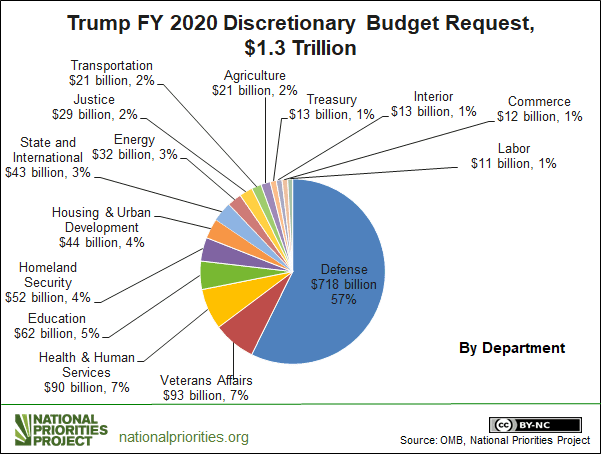“How Do You Pay For It?”
Speaking Security Newsletter | Congressional Candidate Advisory Note 11 | 21 May 2020
Since all of you support Medicare For All, you’ve probably encountered this (often rhetorical) question. I’m also confident you all have already deployed a range of proper, elegant rebuttals.
Here are a couple more from the foreign policy angle, using Speaker Pelosi as a case study (not meant to single her out, it’s just that her language represents the broader discourse of the political establishment).
I hope to express that this isn’t about scoring cheap (but still useful!) points exposing your opponent’s hypocrisy, but to reveal that this is more about the ideology of the ruling class.
In short: concern over ‘the deficit’ is deployed along class lines — deficit politics are only applied to the stuff that (would) reduce inequality. Measures that worsen inequality — like war — are given a free pass (literally). This is one of the clearest expressions of class warfare there is.
Definition
‘Paying for’ something in this context either means raising taxes or imposing new ones, or moving around funds in the existing budget.
Of course, you can ‘pay for’ something by adding to the deficit. But that’s not what the political establishment means when they ask the how do you pay for it question.
Situation: Ideology > hypocrisy
Social spending reduces inequality and national security spending does the opposite. For most of Congress, deficit politics (represented by the “how do you pay for it?” inquiry) only apply to the former. The latter can just be paid for by the deficit. Example:
Speaker Pelosi entered Congress in 1987: three wars since then, none of them ‘paid for.’

From “Political Parties at War” (2013), Gustavo Flores-Macias and Sarah Kreps.
While Pelosi invokes the deficit to deflect programs that would save lives, she makes no mention of it when it comes to funding initiatives that literally take lives. Pelosi and other Democratic leaders have had nothing to say about a war tax to ‘pay for’ the wars in Iraq and Afghanistan except when they were opposed to the idea. For social programs, however:

A quick note on ‘fiscal responsibility’
Pelosi has long insisted that the Democratic Party is all about “fiscal responsibility”. Your opponent has probably espoused similar claims about the party and/or about her-/himself.
Below is a typical breakdown of the annual discretionary budget that most Democrats support with only minor (if any) qualifications.
This distribution of public funds is obviously a problem in and of itself. But for the party that considers itself as the more ‘responsible’ one of the two, devoting the largest chunk of federal resources to the agency that failed its first and only audit 2 years ago strikes me as unseemly.

If the ideological component of how do you pay for it is the main course, then hypocrisy can be dessert. Again, it’s a cheaper critique, but one that’s still tasty so I included it here.
Is your opponent part of the problem?
Most likely. There’s a bunch of ways to see whether your opponent is a hypocrite and/or class warfare incarnate in this regard — some of which are probably better than the method I’m about to suggest — but here’s one path that blends discourse with the legislative record:
1. Is your opponent against Medicare For All, Green New Deal, etc on the basis of cost?
2. Did your opponent support Speaker Pelosi’s pay-as-you-go provision (“PAYGO”), basically an austerity measure to limit social spending?
3. Did your opponent vote for any of the following primary contributors to the federal deficit (for FY2019-2020)?
- The Republican tax bill
- The bipartisan federal spending agreement, in which well over half of discretionary spending went to the military. You can break this down by your opponent’s individual votes on yearly defense authorizations (NDAAs) and appropriations bills, too. The latter is often bundled with other agencies’ annual funding in the form of an omnibus spending package, so looking at your opponent’s votes with respect to NDAAs might make this a little more clear-cut.
- The collection of stimulus bills passed in response to COVID-19.
If it’s a yes to either (1) or (2), and a yes to any one of the items in (3), then your opponent is part of the problem we’re talking about.
Conclusion
Whoever wins the 2020 presidential election, we’ll have to put up with this type of bullshit:

Just another reason why what you’re doing matters so much! Keep me advised on how I can help.
In solidarity,
Stephen (stephen@securityreform.org; @stephensemler)
Further reading
Stephanie Kelton did a wonderful job explaining how easily ‘how do you pay for it’ slid from the realm of the sacred to the profane, here.
SPRI article on how ‘fiscal responsibility’ is killing us, here.



